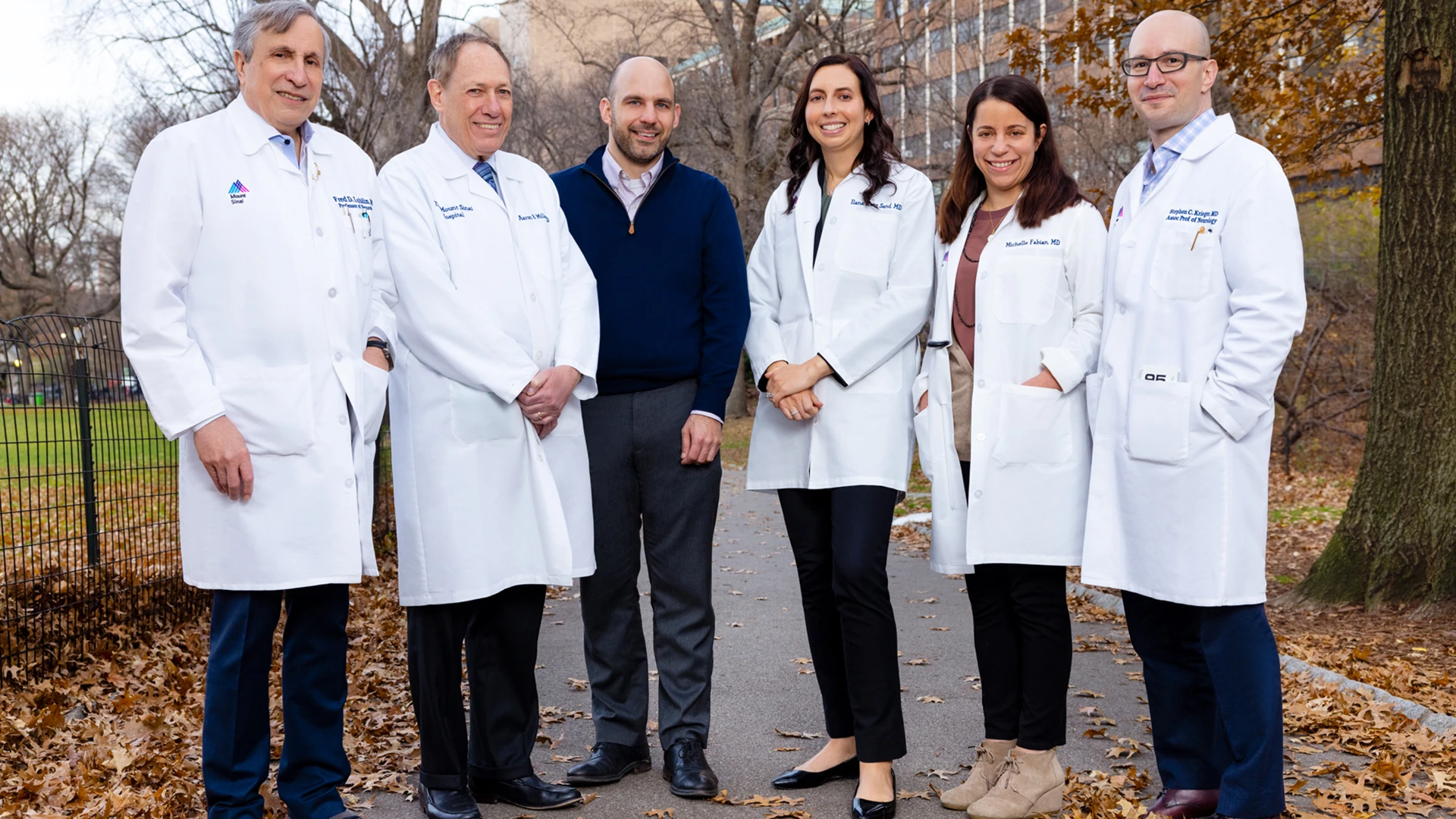
Ilana B. Katz Sand, MD
“We don’t have enough evidence yet to say definitively which dietary factors are best for people with MS, but our study is a big step in moving dietary research in a more rigorous direction so we can determine whether diet may actually serve as a disease modifier,” says lead author Ilana B. Katz Sand, MD, Associate Professor of Neurology at the Icahn School of Medicine at Mount Sinai, and Associate Director of Mount Sinai’s Corinne Goldsmith Dickinson Center for Multiple Sclerosis.
“MRI enables us to establish a link between the dietary habits of people with MS and their brain structure, and we’ve planned longitudinal follow-up with study participants to evaluate relationships between diet and MRI and clinical disability over time as well,” adds Dr. Katz Sand.
Realizing the importance of neurodegeneration in MS, and understanding the links between the MIND (Mediterranean-DASH Intervention for Neurodegenerative Delay) diet and lower incidence of Alzheimer’s disease and lower risk for cognitive decline and dementia, the researchers hypothesized that the MIND dietary pattern might be associated with brain volumes in MS. The MIND diet score is calculated based on reported intake of foods postulated to be important for brain health, with higher scores indicating higher diet quality. Higher scores are driven by increased intake of “brain healthy” foods, including green leafy vegetables, nuts, berries, and olive oil, and lower intake of foods such as pastries, fried foods, and red meat.
Study finds association between dietary scores and thalamic volume
“Our finding was very exciting because it suggests that higher scores on the MIND dietary scale could translate into less of a decline in brain volumes as the disease progresses, consistent with a possible neuro-protective effect in MS.”
– Ilana B. Katz Sand, MD
The research team drew on extensive information, including brain MRIs and food frequency questionnaires, gathered from 185 individuals diagnosed with early MS enrolled in the RADIEMS (Reserve Against Disability in Early MS) study (principal Investigator and senior author, James Sumowski, PhD). What scientists found was an association between the MIND dietary scores of participants and the thalamic volume of the brain.

Mount Sinai's multiple sclerosis clinicians and researchers include, from left: Fred Lublin, MD; Aaron Miller, MD; James Sumowski, PhD; Ilana B. Katz Sand, MD; Michelle Fabian, MD; and Stephen Krieger, MD
“Thalamic atrophy is among the most ubiquitous and early occurring gray matter changes in MS,” explains Dr. Katz Sand. “It is associated with more widespread decline in brain volume and worsening clinical disability in MS over time. Our finding was very exciting because it suggests that higher scores on the MIND dietary scale could translate into less of a decline in brain volumes as the disease progresses, consistent with a possible neuro-protective effect in MS.”
They additionally observed from MRI scans a relationship between greater consumption of omega-3 fatty acids from fish and normal-appearing white matter within the brain, potentially indicating greater microstructural integrity.
MRI scans revealed intriguing finding on omega-3 fatty acids.
While MS pathology was once thought to be exclusively related to well-demarcated lesions, abnormalities in normal-appearing white matter in patients with early MS suggest widespread early neuroaxonal injury that seems to be at least partly independent from lesional demyelinating pathology.
“This finding was particularly interesting to us in the context of prior research led by our co-author, Dr. Yian Gu, demonstrating a protective effect of polyunsaturated fatty acids on cognition in older adults that was also mediated through white matter microstructural integrity,” says Dr. Katz Sand. “Though cognitive aging and MS are pathologically distinct, there are some common pathways contributing to neurodegeneration, such as mitochondrial dysfunction, by which fatty acids could have a similar protective impact in both conditions.” Yian Gu, MD, PhD, is Assistant Professor of Neurological Sciences at Columbia University Irving Medical Center.
Dr. Katz Sand and her colleagues at the Corinne Goldsmith Dickinson Center for MS previously conducted a pilot study of a modified Mediterranean dietary intervention in MS, demonstrating clinical trial feasibility and preliminarily noting a benefit for MS symptoms. Combining the pilot experience with this growing body of new data, Dr. Katz Sand and her colleagues aim to take their research to a higher interventional level to determine if diet may actually act as a disease modifier in MS.
In addition to the planned three-year follow-up study with the RADIEMS participants, renewed funding from the National Institutes of Health will allow for six- and eight-year follow-up investigations with the same cohort. An active program of annual clinical evaluations through the MS Center’s neuropsychology clinic, directed by Dr. Sumowski, Associate Professor of Neurology, and Psychiatry, is also pivotal to the ongoing research effort.
The Corinne Goldsmith Dickinson Center for MS, led by Fred Lublin, MD, the Saunders Family Professor of Neurology, who is internationally acclaimed for his groundbreaking work, has long been at the forefront of multiple sclerosis research. Dr. Lublin most recently published in Brain. Clinicians and researchers include Medical Director Aaron Miller, MD, Professor of Neurology; Associate Director Ilana Katz Sand, MD, Associate Professor of Neurology; Stephen Krieger, MD, Professor of Neurology; Michelle Fabian, MD, Associate Professor of Neurology and Director of the Mount Sinai Hospital Neurology Residency Program; Sylvia Klineova, MD, MS, Assistant Professor of Neurology; and James Sumowski, PhD, Associate Professor of Neurology, and Psychiatry.

Stephanie Tankou, MD, PhD, in her lab, which focuses on the microbiome and regulation of inflammation in the central nervous system

Sam Horng, MD, PhD, investigates the role of astrocytes in autoimmune attack
The CGD Center also includes a number of top young investigators who are pushing the boundaries of knowledge about MS. Among them are physician-scientists Stephanie Tankou, MD, PhD; Sam Horng, MD, PhD; and Erin Beck, MD, PhD, each an Assistant Professor of Neurology.
Dr. Tankou focuses on identifying gut derived bacteria that regulate inflammation in the central nervous system (CNS), with the goal of identifying gut derived bacteria that can serve as biomarkers as well as disease modifying therapies for MS and other CNS autoimmune diseases. Dr. Horng investigates the role of astrocytes in controlling immune cell entry into the brain during autoimmune attack. His aim is to translate this work toward treatment strategies for MS and other CNS autoimmune diseases. Dr. Beck uses advanced MRI techniques and ultra-high field MRI in combination with analysis of cerebrospinal fluid and tissue specimens to understand how lesions form and repair in MS, with the ultimate goal of developing new treatments that target these processes.
